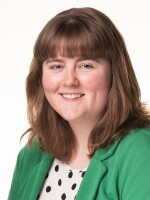This interview has been edited for clarity and conciseness.
Raegan Neufeld: Why did you choose to work in public radio?
Juana Summers: Oh my gosh, what a good question. I mean, I should just say I find it a huge privilege. This is going to sound very Schoolhouse Rock of me, but I love that we have a mission of serving the entire public, from big cities to small towns across this country, and that we have a responsibility to help people have the information they need to navigate decisions in their daily lives, to better understand their communities and the country and the world around them, and also that we give people inspiration every single day and things that make them seek different and fresh perspectives. I don't think there are many other media organizations out there where you get to do all those things at once when you go to work every day.
Neufeld: With that in mind, are there any particular stories or interviews you've done that you know have impacted listeners in some way?
Summers: One of the best parts of the job is the fact that our listeners take the time to either email me or reach out on social media and tell us about the interviews and stories that we do that have made a difference in their lives. I remember early this year, I went to Greenland, actually, when President Trump was talking about potentially acquiring the territory from Denmark or taking it over. And I just got so many emails back from listeners, who were so glad that we were there and bringing them voices directly from the island. There was a lot of talk here in Washington about what the President wanted to do and the political goals, but we were one of the few people who were actually there and talking to people about how the rhetoric in Washington was shaping their lives.
Neufeld: Are there ways that you have been impacted by a story or interview you've done?
Summers: I love getting to sit back and listen to the incredible work that my colleagues do every single day. I feel like I'm always hearing some conversation or some reported piece that inspires me or causes me to think about an issue a little bit differently. One thing I really love that NPR has been doing very recently is, I've loved all of our coverage of the anniversary of Hurricane Katrina, and those stories have been really sticking with me, and have given me some of those NPR driveway moments where I'm hanging out in my car in the parking garage until they finish.
Rachel Schnelle: I was wondering, how has working and living in the Midwest influenced your career now?
Summers: It's had so much influence. I think where you're from and where you grew up, and the experiences you have, they never leave you, right? So anytime I'm going out and doing interviews and talking with people, I bring that background with me. I think it changes the stories that I pitch in our editorial meetings. When I'm thinking about what kind of places I want to go or what kinds of stories I want to tell, those Midwestern values are never too terribly far away. And I think it also makes me realize the importance of the fact that between NPR HQ and the member stations that we work with across the country, of having those diversity of lived experiences, those diversity of backgrounds, is so important to how we do our jobs and how we accurately reflect and show up for those diverse communities. It's just so important, and I'm reminded of that every day.
Schnelle: I also was wondering, what do you wish people knew about public radio, whether that be local or national?
Summers: I think one of the things that people don't realize is just how much we rely on the partnership that we have with our local member stations. I could not do what I do as a national All Things Considered host without the work of local member stations. One of the proudest things I'm able to do, particularly in breaking news moments, is when I get to introduce a story that's coming from a reporter at one of our local member stations who lives in that community, who knows it well, who covers it intently every day, and I love that I'm telling our audience like we have a local expert. We serve this entire country, and I can point to that person's reporting and to share it with everyone. That's just so meaningful.
Schnelle: Is there anything else you'd like to add?
Summers: Right now, I’m honestly just filled with such immense gratitude. I just feel privileged to have this job and that people across the country choose to spend a couple hours with us in the afternoon, letting us be a part of their lives. The fact that we are able to serve them, to inspire them, to help them navigate the complexity of their lives, I just think it's an immense privilege, and I'm so grateful to be in a position to share.
Copyright 2025 Four States Public Radio. To see more, visit Four States Public Radio.




